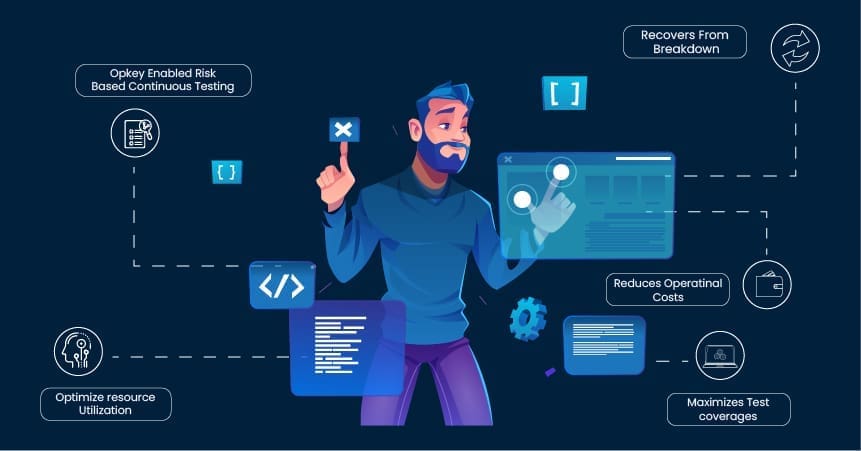Whether you’ve implemented a whole new S/4HANA ERP (Greenfield) or you’ve migrated from SAP ECC to S/4HANA (Brownfield) or performed transition from the current regional SAP landscape into one global SAP S/4HANA, you cannot ignore the importance of testing. SAP is a complex system that supports both customizations as well as integration. Current and expected business flows in SAP ECC as well as S/4HANA need to be tested at several levels to keep business disruption at bay. However, the traditional testing approach for SAP digital transformation is not considered viable due to inadequate coverage, slow speed, & huge maintenance efforts. Furthermore, enterprises also struggle to keep pace with their digital transformation initiative. In this blog, we’ll discuss why a next-gen testing approach is needed by SAP customers to keep pace with their digital transformation initiative.
Why enterprises need to break traditional testing approach for their SAP instance?
The traditional testing approach is error-prone, inaccurate, & negatively impacts time to market. One of the biggest drawbacks of the traditional testing approach is that testing is carried out as an end of development activity. Since bugs are found very late, too much rework, redesign, and rethinking of strategy is needed.
Drawbacks of SAP Conventional Testing Approach
- End-to-End Integration Testing: SAP ecosystem consists of SAP ECC, S/4HANA, SuccessFactor, SAP Ariba, and SAP Hybris. Different business processes are connected with these systems. Apart from this, at times, third party enterprise applications also get integrated with these systems. So, manually testing this complex ecosystem of different applications is a challenging task.
- Inadequate Coverage: Test coverage is a big issue in traditional testing approach since testers write test scripts with guesses of how end users are interacting with the SAP applications. In most of the cases, 100% efforts only delivers 40-50% of coverage, leaving your critical business applications at risks.
- Test Script Maintenance: In traditional testingapproach, testers often struggle to continuously maintain the scripts each time a new build is being delivered for testing, or new functionality is added to the app under test. Keep updating the same script kills most time and effort.
- Insufficient Documentation: Requirement gathering is still a manual process. With little or no details, how would you decide what to test? Even if you bring in SAP-specific subject matter expert (SME) into the team, you’ll find it difficult to prioritize test cases if you haven’t captured details of all the integration touchpoints(applications, systems, workflows, process and data flows etc.)

Risk-based Continuous Testing – Your SAP Digital Transformation Roadmap
Since the speed of innovation and digital transformation success, goes hand-in-hand, enterprises require “Risk-based Continuous Testing” approach to mitigate risks while keeping pace with digital transformation initiative. Continuous testing helps QA teams to proactively deal with business disruptions due to SAP Application failures by testing early, testing often, &testing comprehensively. By accelerating the feedback process on the business risks related to release candidates, continuous testing helps enterprises to achieve quality at speed. However, to achieve risk-based continuous testing, enterprises need to bring in “test automation”. With this, an agile sprint can be tested continuously, ensuring that timely feedback about the bugs and issues can be provided to project teams and fixing can take place early in the cycle.
The Proposed Test Automation Solution for SAP ECC & S/4HANA
The proposed SAP Digital Transformation platform should support
- Risk-based Continuous Testing: “Test everything” approach is not feasible and neither it is necessary since it cannot promise adequate coverage. To meet fast-paced Agile and DevOps initiatives, you need “Risk-based Continuous Testing” for SAP as it helps to track issues faster.
- Change Visibility: Change impact visibility protects enterprises from unwanted business disruptions that can cost revenue, profits or reputations. Enterprises can find out in real-time how short agile sprints have impacted the existing business processes and can take well-informed decision on the release maturity.
- Automatic Test Recommendations: Based on the highlighted risks and impacted areas, SAP test automation platform should recommend test cases to deliver optimal risk coverage. Rather than avoid running the entire test suite for short sprint, AI-driven test automation platforms should provide the minimum tests based on highlighted risks, helping QA teams to reduce their efforts while ensuring adequate coverage.
- Autonomous-healing of Test Scripts: Test script maintenance gives major pains to QA teams. SAP Continuous Test Automation platform should autonomously heal the test scripts by automatically detecting changes without requiring human intervention.
- End-to-end Integration Testing: The proposed solution should support multiple technology stack including web, mobile, APIs, Desktop, Citrix, Mainframes and other legacy applications.
We recommend Opkey
Opkey is the industry’s leading Autonomous Continuous Test Automation Platform for SAP ECC & S/4HANA that takes an analysis of change and prioritization hand-in-hand. By aligning risk-based continuous testing with your business priorities, Opkey delivers optimal risk coverage with focused test automation. Self-healing capabilities, risk-based test recommendations, & end-to-end integration testing of Opkey help customers to keep pace with the rapid rhythm of SAP release cycles/ configuration changes to accelerate digital transformation.









